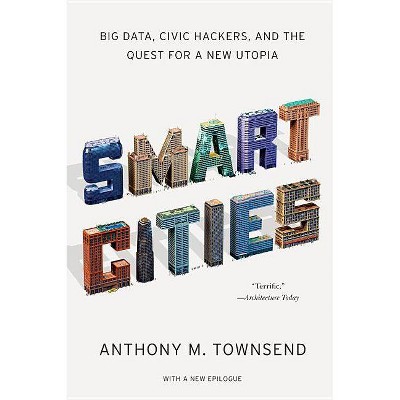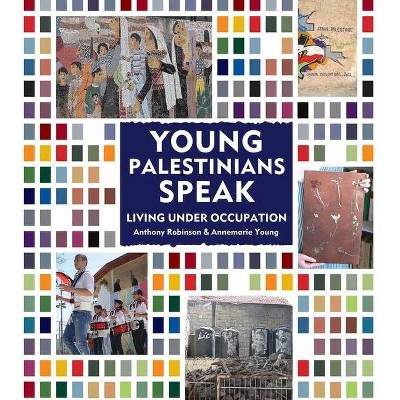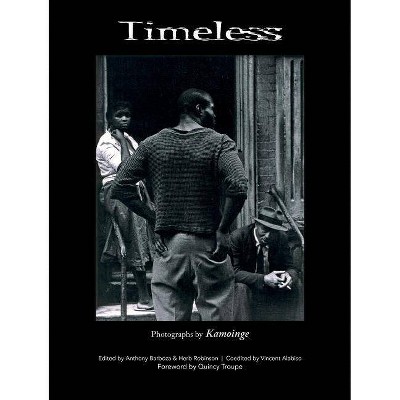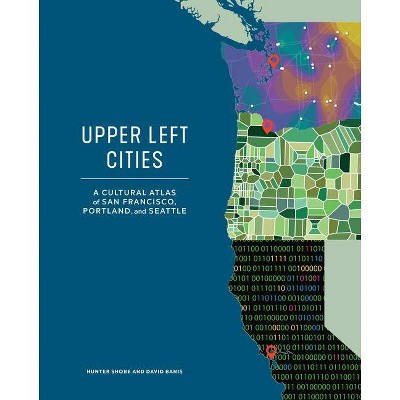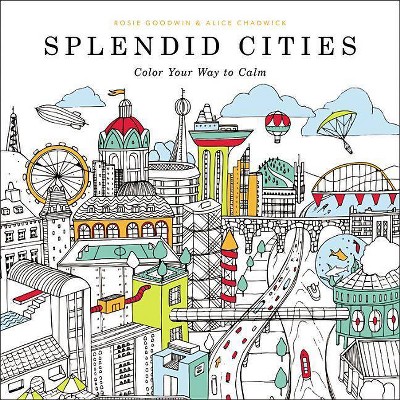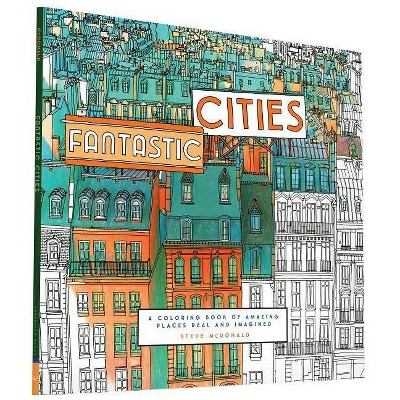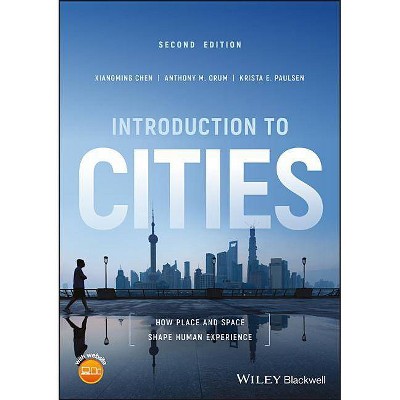Chocolate Cities - by Marcus Anthony Hunter & Zandria F Robinson (Paperback)
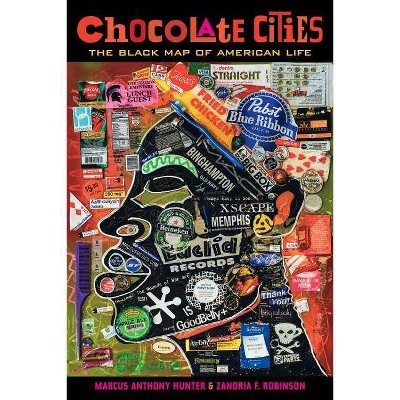
Similar Products
Products of same category from the store
AllProduct info
<p/><br></br><p><b> About the Book </b></p></br></br>"When you think of a map of the United States, what do you see? Now think of the Seattle that begot Jimi Hendrix. The Dallas that shaped Erykah Badu. The Holly Springs, Mississippi, that compelled Ida B. Wells to activism against lynching. The Birmingham where Martin Luther King, Jr., penned his most famous missive. Now how do you see the United States? Chocolate Cities offers a new cartography of the United States--a "Black Map" that more accurately reflects the lived experiences and the future of Black life in America. Drawing on cultural sources such as film, music, fiction, and plays, and on traditional resources like Census data, oral histories, ethnographies, and health and wealth data, the book offers a new perspective for analyzing, mapping, and understanding the ebbs and flows of the Black American experience--all in the cities, towns, neighborhoods, and communities that Black Americans have created and defended. Black maps are consequentially different from our current geographical understanding of race and place in America. And as the United States moves toward a majority minority society, Chocolate Cities provides a broad and necessary assessment of how racial and ethnic minorities make and change America's social, economic, and political landscape"--Provided by publisher.<p/><br></br><p><b> Book Synopsis </b></p></br></br>From Central District Seattle to Harlem to Holly Springs, Black people have built a dynamic network of cities and towns where Black culture is maintained, created, and defended. But imagine--what if current maps of Black life are wrong? <i>Chocolate Cities</i> offers a refreshing and persuasive rendering of the United States--a "Black map" that more accurately reflects the lived experiences and the future of Black life in America. Drawing on film, fiction, music, and oral history, Marcus Anthony Hunter and Zandria F. Robinson trace the Black American experience of race, place, and liberation, mapping it from Emancipation to now. As the United States moves toward a majority minority society, <i>Chocolate Cities</i> provides a provocative, broad, and necessary assessment of how racial and ethnic minorities make and change America's social, economic, and political landscape. <br><p/><br></br><p><b> From the Back Cover </b></p></br></br>"A masterpiece! <i>Chocolate Cities </i>is a testament to the magic that is possible when you combine the funky wisdom of the Mothership with the best scholarship from the Ivory Tower."-- George Clinton, Rock & Roll Hall of Fame musician and founder of Parliament Funkadelic <p/> "<i>Chocolate Cities </i>is simply the most instructive and illuminating book on American geography and culture I have ever read. Hunter and Robinson pull no punches and sacrifice no nuance in countering traditional hegemonic notions of race, space, and movement with loving, textured Black American notions of race, space, and movement. <i>Chocolate Cities </i>is a critical occasion to rethink everything we thought we knew about American space and spatial liberation."-- Kiese Laymon, author of <i>Long Division</i> <p/><b>"</b>A significant, timely, and provocative race-based social mapping of the United States, reflecting a sense of the everyday lives of African Americans. These masterful sketches, rooted in oral history and illuminated by poetry, music, fiction, and film, make it an extraordinary book that needs to be read and considered far beyond the academy."--Elijah Anderson, Yale University, author of <i>The Cosmopolitan Canopy: Race and Civility in Everyday Life</i> <p/> "<i>Chocolate Cities</i> is bold on too many levels to name. It rethinks our standard notions of geography, data, history, academic discipline, and theory. It sings and dances off the page. <i>Chocolate Cities</i> kicks up enough funk to provoke a major paradigm shift in research on Black places."--Mary Pattillo, author of <i>Black on the Block: The Politics of Race and Class in the City</i> <p/> "<i>Chocolate Citie</i>s is a terrific contribution to our understanding of the role of expressive culture in remapping the boundaries of racialized space. In it, we learn both about the legacies of structural racism and how black communities responded creatively to it to build solidarity, foster black joy, and resist oppression through an intersectional fight for humanity waged from coast to coast, in big cities and small towns, on trains, planes, and buses, in songs and on the page, in the church, in the courts, and in the streets."--Tricia Rose, Brown University <p/> "In one of the most original treatments of the urban I have read in decades, Hunter and Robinson overturn the dominant social science imaginary that see 'inner' cities only in crisis, chaos, and decline. Theirs is a sociological imagination constructed from the eyes, ears, hearts, memories, songs, and prayers of real city folk, those Black communities who cling to their village, continually remake their culture, and build power to beat back the chaos imposed on them. This is what it means to live in a Chocolate City. Chocolate, after all, is more than a color."--Robin D. G. Kelley, author of <i>Freedom Dreams: The Black Radical Imagination</i> <p/> "Modeling the very best of collaborative research and writing, <i>Chocolate Cities</i> is a brilliant, creative, and innovative work. The authors engage the rich literary and musical heritage that black city dwellers have bequeathed the world while building upon and extending the best social science and humanities scholarship. Hunter and Robinson offer us a beautifully written work that is sure to become an influential classic in the fields of Sociology, American Studies, African American Studies, and beyond."--Farah Jasmine Griffin, Director, African American Studies, Columbia University <p/> "Hunter and Robinson offer an iteration of black thought that explores how black life--as song and tune, as fight and struggle--is necessarily geographic life. Here, threads of black geographies emerge across and underneath prevailing cartographies--within the USA while also reaching out to touch other global diasporic sites--to show that the black imagination is tied to place-making practices. Powerfully, the authors write black geographies and chocolate cities as 'living geographies'--sites shaped by brutal and unforgiving racial economies that engender creative praxis and freedom struggle."--Katherine McKittrick, author of <i>Demonic Grounds: Black Women and the Cartographies of Struggle</i> <p/> "Rarely does a book disrupt existing paradigms and displace dominant narratives. This is exactly what Hunter and Robinson achieve in <i>Chocolate Cities</i>. This book changes the ways we understand Black and White Americans in profound ways, especially how they experience and define themselves according to geographic regions throughout the United States. This book creatively weaves together data from rich and untapped sources to tell a unique American story. A must read for all who wish to rethink current racial dynamics in America and unravel them in fresh new ways."--Aldon Morris, author of <i>The Scholar Denied: W. E. B. Du Bois and the Birth of Modern Sociology</i> <br> <p/> <p/> <p/> <p/><p/><br></br><p><b> Review Quotes </b></p></br></br><br>"<i>Chocolate Cities</i> offers a critical contribution to urban sociology through its refreshing approach to the cultural geography of Black life. . . . <i>Chocolate Cities</i> makes compelling theoretical arguments that encourage scholars and practitioners to rethink the relationship between race, racism, culture, and space."-- "City & Community"<br><br>"A tour de force. Hunter and Robinson work assiduously and effectively to help readers to think about how seemingly disconnected ideas, themes, and practices should be understood together. The book paints a portrait of the complexity of black life, culture, politics, and interests."-- "American Journal of Sociology"<br><br>"Good books enlighten and educate. Great books mess up your mind. Good books deepen many a field of study. Great books blow holes in many fields of study. Good books deliver a line of argument. Great books reframe and problematize a line of argument. Good books help you settle down and furnish your intellectual home. Great books set you wandering and teach you that you are homeless. Good books bring insight. Great books bring the funk. I could go on with this list of contrasts between good and great. Yes, Marcus Anthony Hunter and Zandria F. Robinson' s <i>Chocolate Cities: The Black Map of American Life</i> is a great book, yes it messed up my mind, and yes it does all those things great books do."-- "Ethnic and Racial Studies"<br><br>"Hunter and Robinson's <i>Chocolate Cities</i> gives sociology a needed shaking up and will influence the discipline for years to come. By putting Black agency at the center of their epistemology, Hunter and Robinson's <i>Chocolate Cities</i> cuts across and shapes multiple sociological microcosms."-- "Sociology of Race and Ethnicity"<br><br>"A very smart new book by two culturally agile sociologists. . . . While Chocolate Cities is a story of inventive adaption, fierce survival and Black joy, it is also a history of trauma and communities under siege. This book stands as a witness to the investment of struggle, skill and resources it has taken to build and sustain chocolate cities. It is also a testament to the criminal failure of America to see and honor these essential points on the map."-- "Kalamazoo College/Praxus Center"<br><br>"Hunter and Robinson have set out a marker for thinking differently about black people in urban America."-- "PopMatters"<br><br>"Hunter and Robinson offer an insight into the ways black folks have eked out a social world regardless of the racism, segregation, and brutality often concomitant in cities across the North American experience. ... For undergraduates, graduates, and any lay reader interested in black life in the US."-- "CHOICE" (7/1/2018 12:00:00 AM)<br><br>"If Chocolate Cities were itself made of chocolate, it would come in a variety of forms: the central theses of the book like unsweetened cacao nibs, true and deep-flavored, long-lasting, challenging, surprising. Census data as chocolate bar, scored into bite-size forms. Musical references like the aroma of chocolate, wafting through the room. And the personal stories Robinson and Hunter delve into are multi-layered, well-baked undertakings." -- "Memphis: The City Magazine"<br><p/><br></br><p><b> About the Author </b></p></br></br><b>Marcus Anthony Hunter i</b>s Chair of the Department of African American Studies, Associate Professor of Sociology, and he holds the Scott Waugh Endowed Chair in the Division of the Social Sciences at the University of California, Los Angeles. He is the author of <i>Black Citymakers: How the Philadelphia Negro Changed Urban America </i>and the president of the Association of Black Sociologists. <b>Zandria F. Robinson </b>is Associate Professor in Rhodes College's Department of Sociology and Anthropology. She is the author of <i>This Ain't Chicago: Race, Class, and Regional Identity in the Post-Soul South </i>and coeditor of <i>Repositioning Race: Prophetic Research in a Postracial Obama Age.</i> <br>
Price History
Price Archive shows prices from various stores, lets you see history and find the cheapest. There is no actual sale on the website. For all support, inquiry and suggestion messagescommunication@pricearchive.us
